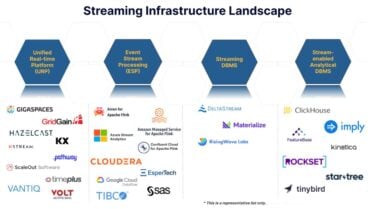
In this week’s real-time analytics news: Several companies announced generative AI offerings or enhancements to their product lines.
Keeping pace with news and developments in the real-time analytics market can be a daunting task. Fortunately, we have you covered with a summary of the items our staff comes across each week. And if you prefer it in your inbox, sign up here!
Salesforce launched Einstein GPT, a generative AI CRM technology, which delivers AI-created content across every sales, service, marketing, commerce, and IT interaction. Einstein GPT will infuse Salesforce’s proprietary AI models with generative AI technology from an ecosystem of partners and real-time data from the Salesforce Data Cloud. With Einstein GPT, customers can then connect that data to OpenAI’s advanced AI models out of the box or choose their own external model and use natural-language prompts directly within their Salesforce CRM to generate content that continuously adapts to changing customer information and needs in real time.
SparkCognition announced the launch of its Generative AI Platform, a solution focused on the needs of the industrial sector. The platform will enable organizations to apply AI even when data sets are sparse, enhancing and accelerating outcomes. Specifically, SparkCognition’s Generative AI can autonomously augment data sets by generating high-quality content in the form of synthetic text, images, audio, and other signals.
ThoughtSpot announced a new integration with GPT-3, the popular large language model (LLM) from OpenAI, to make analytics accessible, trusted, and scalable through artificial intelligence. This includes the launch of ThoughtSpot Sage, a new search experience that combines LLMs like GPT-3 with ThoughtSpot’s patented search technology.
Databricks announced the launch of Databricks Model Serving to provide simplified production machine learning (ML) natively within the Databricks Lakehouse Platform. Model Serving removes the complexity of building and maintaining complicated infrastructure for intelligent applications. Organizations can leverage the Databricks Lakehouse Platform to integrate real-time machine learning systems across their business, from personalized recommendations to customer service chatbots, without the need to configure and manage the underlying infrastructure. Databricks Model Serving is now generally available on AWS and Azure.
SAP announced the SAP Datasphere solution, the next generation of its data management portfolio, which gives customers easy access to business-ready data across the data landscape. SAP Datasphere helps eliminate this hidden data tax, enabling customers to build a business data fabric architecture that quickly delivers meaningful data with business context and logic intact. SAP also introduced strategic partnerships with industry-leading data and AI companies – Collibra NV, Confluent, Databricks, and DataRobot – to enrich SAP Datasphere and allow organizations to create a unified data architecture that securely combines SAP and non-SAP data.
Real-time analytics news in brief
Armory released several plugins for Spinnaker, an open-source, multi-cloud Continuous Deployment tool. The plugins are designed to make Spinnaker faster and more secure. The plugins include Scale Agent to manage all Kubernetes deployments easily, securely, and dynamically; Policy Engine that reduces operational risk, increases stability, and streamlines the adoption of modern DevSecOps practices; Pipelines-as-Code that unites continuous deployment pipelines with application development; and Secrets Manager for source control repeatability and maintenance.
Appian announced the immediate availability of the latest version of the Appian Platform for process automation. The new release features enhancements in total experience, data fabric, automation, and process mining, all underpinned by Appian’s industrial-strength low-code design.
DataGrail launched a new Privacy Dashboard that provides actionable recommendations to improve privacy management in an ongoing and scalable way. The dashboard gives instant visibility into the current and historic health and impact of a company’s privacy program.
New Relic announced CodeStream code-level metrics and service-level telemetry to deliver insights into software performance all the way down to the code level. The solution allows developers to quickly identify issues before they hit production. By bringing telemetry data to where developers build and flow, they can access meaningful data without leaving the Integrated Development Environment (IDE).
ngrok, an ingress-as-a-service platform, announced ngrok-go, an idiomatic Go package for embedding secure ingress directly into Go applications. Ngrok-go lets developers serve Go apps on the internet in a single line of code without the hassle of setting up low-level network primitives like IPs, certificates, load balancers, or ports. ngrok-go is open source and available on GitHub, with API reference documentation accessible on go.pkg.dev.
Provectus announced the v0.11 release of its First Open-Source Data Discovery (ODD) and Observability Platform. In the latest version, Provectus enhances the data discovery and data observability experiences of the ODD Platform by presenting metrics, search explanations, and a new dataset structure UI to provide a better experience for users in the Data Discovery phase.
Rapid announced the public beta launch of its API Hub for Business. This new offering allows any business to quickly launch a custom hub to grow its ecosystem, create new revenue streams, and monetize APIs with a flexible price model that supports every API protocol and every API. Key features of API Hub for Business include full ownership of the payment process, a customizable API Hub, and a unique domain.
Rapid.Space launched EdgePOD, a 1U server designed to be deployed at the edge. EdgePOD helps reduce latency, lower costs, and protect businesses against cloud service outages. EdgePOD has been designed with an open-source approach that allows for an interchangeable design. Depending on business needs, an EdgePOD can be installed with a Hygon CPU for the Chinese market, an NXP CPU for the European market, or an AMD CPU for the US market.
Redpanda announced new connectors to popular data sources for Redpanda Cloud. With a few clicks, users can push data to analytics services like Snowflake and BigQuery or capture changes from PostgreSQL and MySQL. This adds to the existing list of connectors available in Redpanda Cloud. The company also announced the availability of Redpanda platform 23.1 with new features that lower the bar to adoption, improve data security and safety, and enhance system scalability.
Tredence launched Energy.AI, an AI solution to help telecom, technology, manufacturing, and CPG companies increase energy efficiency and meet Environmental, Social, and Governance (ESG) and UN Sustainable Development goals. Energy.AI helps enterprises monitor, capture, and optimize energy usage and improve operational efficiency, increasing speed to action by a minimum of 30 percent.
Partnerships, collaborations, and more
AtScale announced that it has been approved by Snowflake as a Snowflake Ready Technology Validation Partner. The Snowflake Ready Validation Program recognizes partners that have completed a 3rd party technical validation to confirm their Snowflake integrations are optimized with an emphasis on functional and performance best practices.
Axelera AI announced a strategic partnership with Advantech. Combining Advantech’s expertise in embedded and industrial PCs and Axelera AI’s disruptive edge AI technology, together they will bring the inference power of a data center to edge devices, enabling customers to process data in real time, reducing latency while increasing efficiency.
Canonical, the publisher of Ubuntu, announced it has joined the Eclipse Software Defined Vehicle Working Group. The group focuses on advancing software-defined vehicles and pushes innovations in auto-grade solutions using open-source software. Specifically, the next generations of vehicles will rely on cloud-native approaches. As such, Ubuntu will help speed development and deployment.
Census announced a new integration and partnership with Datadog.By adding Datadog data quality and security monitoring, Census customers can guarantee the health of their business-critical data pipelines and track the health of real-time reverse ETL syncs using custom alerts and dashboards.
Concentric AI, a provider of intelligent AI-based solutions for autonomous data security posture management (DSPM), announced it has partnered with CTERA. CTERA seamlessly integrates Concentric AI’s Semantic Intelligence solution into customer environments by deploying an edge filer that acts as a cache server for Concentric AI’s data security posture management capabilities.
Instabase announced the availability of its platform in the Microsoft Azure Marketplace. Instabase customers can now benefit from simplified billing and procurement when using Azure and take advantage of the productive and trusted Azure cloud platform with streamlined deployment and management.
Jitterbit announced it has acquired Zudy. The newly acquired platform complements Jitterbit’s existing solutions with additional choice and flexibility, making Jitterbit’s full suite of tools and services available via cloud deployment, on-prem installation, or a hybrid approach.
Google Cloud and MongoDB announced a major partnership expansion, which includes plans to double the scope of Google Cloud infrastructure that MongoDB needs to support the accelerating adoption of Atlas. The expansion includes a number of focus areas and new initiatives, including deepened product integrations, a new initiative supporting startups, and expanded go-to-market initiatives.
Mendix, a Siemens business, announced significant progress in the company’s collaboration with Amazon Web Services (AWS). A new offering from the collaboration includes a new Authentication Connector for AWS services that manages the authentication between Mendix and AWS services, removing one of the most common challenges to integrating Mendix apps with any of the 200+ AWS services. Additionally, the Mendix Reference Deployment enables easy setup of Mendix in the customer’s AWS environment, automatically provisioning 95 AWS services.
Sonata Software announced that it has signed a Global Gold Services partnership agreement with Sinequa. This partnership enables Sonata to offer its customers an intelligent search solution on which knowledge-intensive organizations can support enterprise-wide search and develop customized domain and situational applications.
Teradata announced the integration and general availability of Teradata VantageCloud, a complete cloud analytics and data platform, with Microsoft Azure Machine Learning (Azure ML). VantageCloud’s scalability analytics – ClearScape Analytics – combined with Azure ML’s ability to simplify and accelerate the ML lifecycle helps customers unlock the full value of their data, even in the most complex and demanding environments.
UiPath announced that data science teams using Amazon SageMaker can now connect to UiPath to quickly and seamlessly connect new ML models into business processes without the need for complex coding and manual effort. By connecting Amazon SageMaker to UiPath, users can rapidly deploy new ML models into production, optimize the productivity of data science teams, and increase the speed of ML innovation.
Userful Corporation announced it has been invited to join the NVIDIA Inception program. Inception will allow Userful to leverage NVIDIA’s most advanced features and provide access to collaborate with NVIDIA’s R&D leaders. Userful will also have full access to the NVIDIA DeepStream software development kit (SDK) team to support the development and deployment of vision AI and low-latency streaming technologies.
If your company has real-time analytics news, send your announcements to [email protected].
In case you missed it, here are our most recent previous weekly real-time analytics news roundups:




























